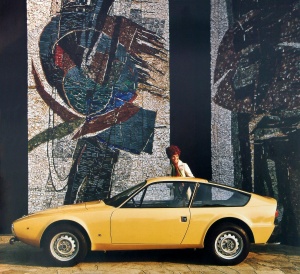Alfa Romeo Junior
One of the things which marked Alfa Romeo from lesser makers from the 1950s through to the 1970s was that it was able to make small runs of special, lightweight, coupe versions of its mainstream cars. The most prized of these were the cars bodied by Zagato, an expression of the historic relationship between the two companies.
The Alfa Romeo 105 series of Spiders and sedans provided lively performance. Equipped with both 1.3- and 1.6- liter powerplants, the larger DOHC engine produced 109 hp, with 103 lb./ft torque low in the rev range. Combined with a five-speed gearbox and Alfa Romeo's sweet chassis with four-wheel disc brakes, it was an outstanding performer in its class.
Zagato's two-seat coupe body weighed 182 lb. less than the stock Giulia GT. Top speed increased to 118 mph, but that does not tell the whole story. The car was much more nimble and responsive, and the brakes had less work to do, so it was astonishingly rapid over winding roads, or in the mountains. Zagato made just 402 examples of the lightweight coupe with the 1.6 engine, and the Swiss-registered car pictured here is a fine representative of the type.
1972 Junior 1300 Zagato
- 1972 Junior 1300 Zagato 1.jpg
- 1972 Junior 1300 Zagato 2.jpg
- 1972 Junior 1300 Zagato 3.jpg
- 1972 Junior 1300 Zagato 4.jpg
When Alfa introduced the 1570cc Giulia engine in 1962, it disappointed many customers who valued the lower Italian circulation tax of the 1290cc Giulietta engine. Because of the lukewarm reception of the new Giulia Sprint GT, and in part to retain its 1300cc clients, Alfa re-introduced the Giulietta Sprint with a 1290cc version of the Giulia engine at the 1964 Geneva show. This car was the progenitor of Alfa's Junior line. From 1964 on, Alfa offered a range of displacements for its passenger cars, always including the 1300cc tax bracket. The Junior designation was first applied to the 1966 GT coupe. When the 1750 series was introduced in 1967, the Junior range was enlarged to include both 1300 and 1600 engines. In 1969, Alfa showed a Junior Zagato with the 1290cc engine at the Turin show.
Typical of Alfa, the production version did not appear until much later, and well after the initial excitement had abated. The Junior Z finally went on sale at the end of 1970. Two years later, the 1570cc version of the Junior Zagato was shown at the Turin show. A slightly revised Junior Zagato, with heavier bumpers and changed interior appointments, debuted at the 1972 Turin show. The confluence of the Junior and Zagato lines in this car focuses not on engine displacement, however, but its bodywork. Zagato-bodied Alfas have been benchmark cars in design and performance since the RL SS of 1926. Zagato bodied the 1950-1951 championship Alfettas, and about thirty-five coupes on the 1900 floorpan in 1956-1957. But when they began producing Giulietta Sprint Zagatos, Alfa refused to sell them bare chassis. The Zagatos were forced to buy finished Giulietta Sprints off the showroom floor, and then remove the bodywork, an almost prohibitively expensive procedure. Alfa remained dedicated to Bertone for its special-bodied coupes and only agreed to cooperate with Zagato when they finally identified the need for a lightweight, aerodynamic coupe which was more competitive than the Sprint Speciale. The results were the SZ and SZ Coda Tronca Giulietta Zagatos, among the most collectible Alfas extant.
Alfa Zagatos are typically dressed all in aluminum alloy. However, the Junior version carries steel in its most strategic areas. As a result, at 2,094 lb. it is significantly heavier than the 1,455 lb. of the Giulia Tubolare Zagato or the 1,675 lb. of the alloy-paneled GTA Junior. Unlike virtually all other Alfa Zagatos, this is not a race car, but a dependable, nimble, daily driver. The Junior Zagato is very similar to the Sprint Speciale in that it is a unique long-distance grand touring car that assures high average speeds in spite of its diminutive displacement. The interior of the Junior is spacious, the seats and driving position are comfortable and there's ample glass for excellent outward visibility. It's impossible to miss the striking similarity between the Junior Zagato and Honda's first CRX. Ultimately, this has to be taken as an honor for the Zagato design, which is crisp and still distinctive, even in the 21st century.
External Links
Alfa Romeo 1300 JZ (Junior Zagato) Register
| <- Previous | Alfa Romeo Automobiles S.p.A., a subsidiary of the Fiat S.p.A. since 1986, car timeline, 1946-1979 | Next -> | ||||||||||||||||||||||||||||||||||||||||||
| Type | 1950s | 1960s | 1970s | |||||||||||||||||||||||||||||||||||||||||
| 0 | 1 | 2 | 3 | 4 | 5 | 6 | 7 | 8 | 9 | 0 | 1 | 2 | 3 | 4 | 5 | 6 | 7 | 8 | 9 | 0 | 1 | 2 | 3 | 4 | 5 | 6 | 7 | 8 | 9 | |||||||||||||||
| Small family car | Dauphine* | Alfasud | ||||||||||||||||||||||||||||||||||||||||||
| Compact executive car | Giulietta (750/101) | |||||||||||||||||||||||||||||||||||||||||||
| Giulia | Giulietta (116) | |||||||||||||||||||||||||||||||||||||||||||
| 1750 | Alfetta | |||||||||||||||||||||||||||||||||||||||||||
| Executive car | 1900 | 2000 | 2600 | 2000 | Alfa 6 | |||||||||||||||||||||||||||||||||||||||
| Cabriolet | 1900 | 2000 | 2600 | |||||||||||||||||||||||||||||||||||||||||
| Coupé | Giulietta | Sprint | ||||||||||||||||||||||||||||||||||||||||||
| Giulia | Alfetta GT/GTV and GTV6 | |||||||||||||||||||||||||||||||||||||||||||
| 1900 | 2000 | 2600 | ||||||||||||||||||||||||||||||||||||||||||
| Roadster | Spider | |||||||||||||||||||||||||||||||||||||||||||
| Gran Sport Quattroruote | ||||||||||||||||||||||||||||||||||||||||||||
| Sports car | …6C 2500 | Montreal | ||||||||||||||||||||||||||||||||||||||||||
| 33 Stradale | ||||||||||||||||||||||||||||||||||||||||||||
| Off-road | Matta | |||||||||||||||||||||||||||||||||||||||||||
| Racing car | TZ/GTA | |||||||||||||||||||||||||||||||||||||||||||
| …158/159 | Tipo 33 | 177 | ||||||||||||||||||||||||||||||||||||||||||
| *Dauphine was produced under Renault license | ||||||||||||||||||||||||||||||||||||||||||||
